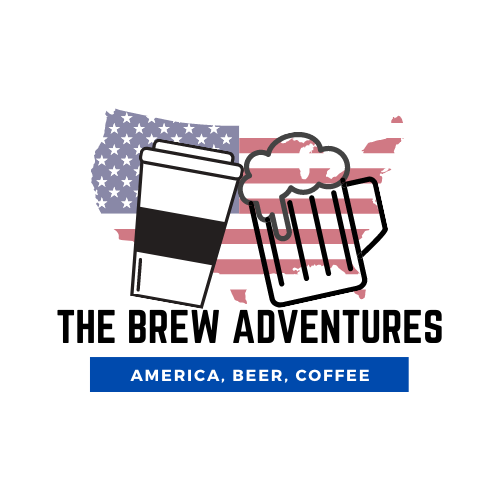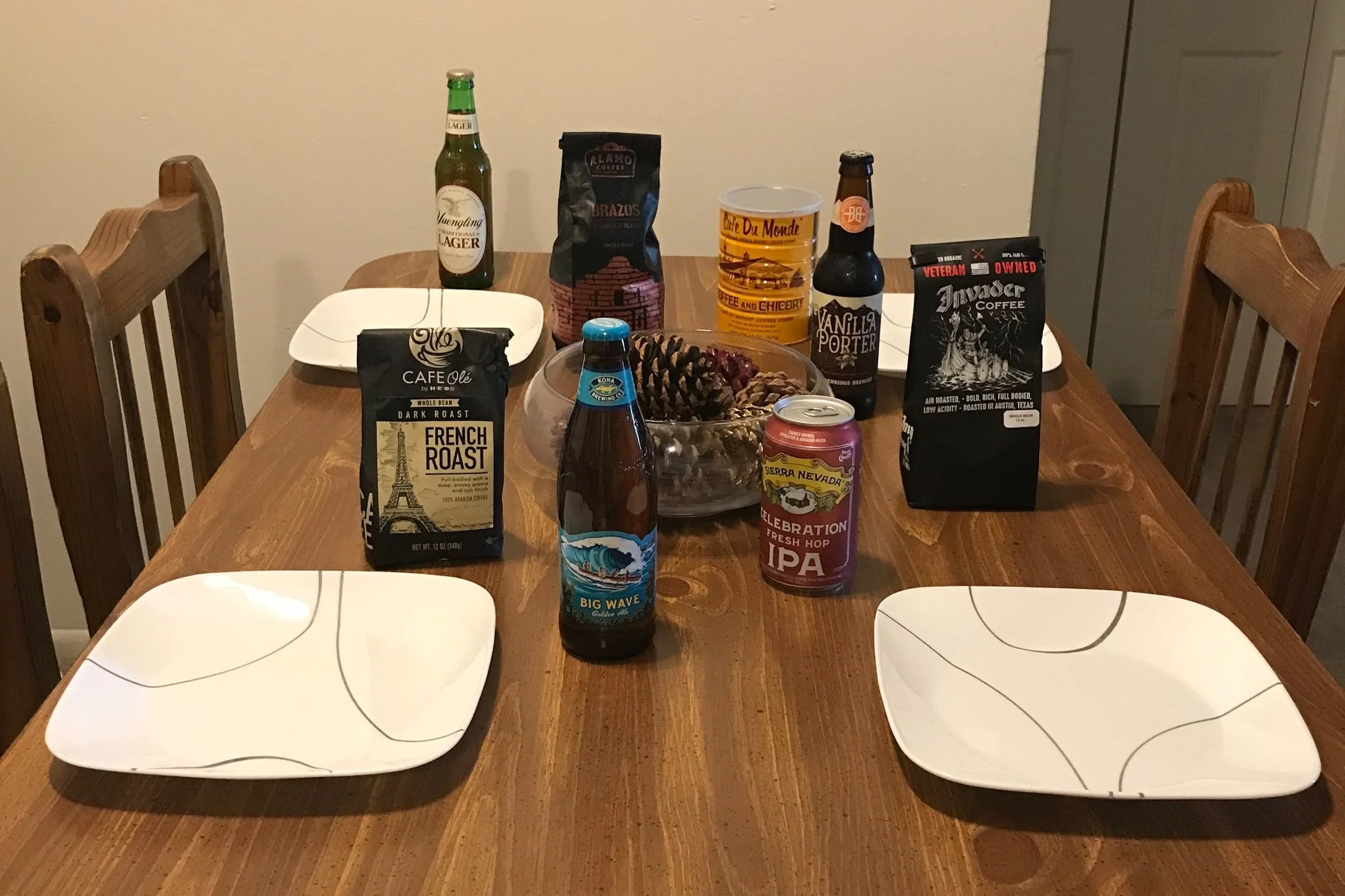Pass the Genes: Do genetics affect Beer and Coffee consumption?
Sitting around the holiday table this year, we couldn’t help but notice everyone’s drink preferences. They were all different. We may have all been eating the same food -- in different proportions, but the same food nonetheless -- but that could not have been further from the truth when it came to our beverage choices.
Mrs. Brew and I hosted this year for both sets of our parents. Planning was no small thing when considering dietary restrictions, food partiality, is it too spicy for some, or not spicy enough for others, and so on. But the food seemed to be the easy part. The drinks were something all their own.
Around the breakfast table we had a spread of coffee (being coffee enthusiasts, of course), water, three different juices (nobody wanted the oatmeal raisin cookie stout for some reason). And the alcohol list was just as long. We had margaritas, golden ales, amber lagers, light lagers, and it was even more divided when we went out to eat.
We couldn’t help but wonder if the differences and similarities in our taste preferences came down to genetics, specifically for coffee and alcohol. Mr. Brew, having a background in science and genetics, knew that with some research we would be able to find the answers to the questions we had: Is our preference genetic-based? Is it environmental? Why did some hardcore coffee drinkers think one coffee was too bitter while the rest of us enjoyed it? Why were the beer and alcohol selections so extensive and tedious?
After doing a bit of research we think we’ve found a few answers to these questions.
Let’s brew some science
There are between 20,000 and 25,000 genes in the human genome. Of those, 2 are known to detect sweetness, and about 40 are suspected to detect bitter flavors. That’s quite a gap when you think about those genes creating flavor receptors on individual taste buds. Of course, we don’t express all of those genes, but the ones we do (or don’t) express affect our flavor preferences.
After further research we found that the TAS2R38 gene (Learn.genetics.utah.edu) is the gene that has been identified as the bitterness gene that affects whether we can taste bitter flavors or not. And there are believed to be around three genes that affect hop detection (Huffpost.com). But the original idea of perceived bitterness between individuals goes back to 1931 when a scientist named Arthur Fox dumped some PTC (Phenylthiocarbamide) that got into the air. His colleague complained of how bitter it was while Fox tasted nothing. They conducted further research based on that simple accident, and it is believed nowadays that about 25% of people cannot detect bitterness, while 75% can (Huffpost.com).
Studies have been done, often trying to discern why people prefer coffee or tea, that also reveal that beverage preferences are related to our abilities to detect the bitterness of caffeine and quinine -- a substance in tonic water (smithsonianmag.com). It would make sense that if you are able to taste more of the bitter flavors of coffee (or beer) that you might shy away from it. But these studies found that the opposite was usually true -- those who could taste more bitter flavors often preferred the bitter coffee.
But what does this have to do with coffee and beer preference?
The coffee and beer industries have evolved greatly in our lifetimes. An IPA was like an underground beer when Mr. Brew was coming up, and most of the coffee we were exposed to came from a red can. So, have we ignored the genetics our parents passed on to us and developed different palates, or has our new environment caused us to traverse a different route with bolder and more bitter flavors?
The truth is that it’s probably a combination of many things.
It is believed that the bitterness detecting genes (again, approximately 40 of them compared to 2 sweet detecting genes) were an evolutionary adaptation that aided early hunter gatherers in detecting what foods might be poisonous or not, as many poisonous plants taste bitter. Nowadays, that sense is not as important thanks to the FDA.
Which brings us to the idea of acquired taste. Mr. Brew’s parents never drank coffee when he was a kid. Now he drinks it every day and explores new flavors regularly--light and acidic to dark and roasted. His parent’s also never drank anything heavier than a Budweiser, and he regularly enjoys stouts and IPAs.
The opposite similarity can be said about Mrs. Brew’s family. They drink two pots of coffee a day and hardly ever drink beer, but they complained of the bitterness in the chicory coffee we made. Yet as a child, Mrs. Brew was sickened by the smell of coffee and swore she would never drink it -- which is the opposite of her reaction now. In the beer world, she started with the light beers and now regularly enjoys darker and heavier beer flavors.
Don’t forget the reward.
We know a number of people who absolutely detest IPAs, and beer in general, but they can handle the bitterness of a strong cup of coffee, and vice versa. This may be because of the reward center in our brain that tells us we’re having a good time, or reminds us of some good time we’ve had. Whether that be the feeling of a morning pick-me-up (always gotta chase that first high), or the memory of sharing a strong beer with close friends.
Coffee preference is heavily influenced by a person’s feeling of satisfaction while drinking. Whether or not you are convinced that you can’t start your day without a cup of coffee, the caffeine in coffee affects you. Our genes determine how caffeine reacts inside our body -- sometimes we are building up a resistance, waking up, and feeling energized while other times people feel sick to their stomachs, anxious, or find it impossible to sleep after even a sip. These differences could be due to variations in a single nucleotide of your DNA (nationalgeographic.com/science).
Rarely do you meet someone who absolutely loves a bitter, mouth-numbing IPA the first time they try one. Mr. Brew claims he is one of those people, but he’s a liar. The same is true for black coffee, or even the lightest of beers. Which is often why we see a cup of joe at a coffee shop served with a tower of whipped cream. And what about the New England IPA? A gentler, juicer, and fruitier cousin of the hard-hitting West Coast IPA. Was it created subconsciously to combat the dislike some people have for a traditional IPA? In our opinion: Likely so.
Genetics, Environment, and Reward
Genetics do play an important role (likely the most important) when we are growing up, simply because we eat and drink what our parents present to us. And, typically, we like it because we have a similar genetic makeup to our parents’. But once we grow older, and are able to make our own decisions, we find new flavors to explore and boundaries to push.
It’s fun to nerd out over beer and coffee. It’s why we started this blog. But the questions are interesting, and even important when considering our own culture and upbringing. Even though our genetics make us unique and different, food, coffee, and beer unite the world in their own interesting ways -- even if everyone is drinking something different at your holiday meal.
Cheers!
Mr. and Mrs. Brew

